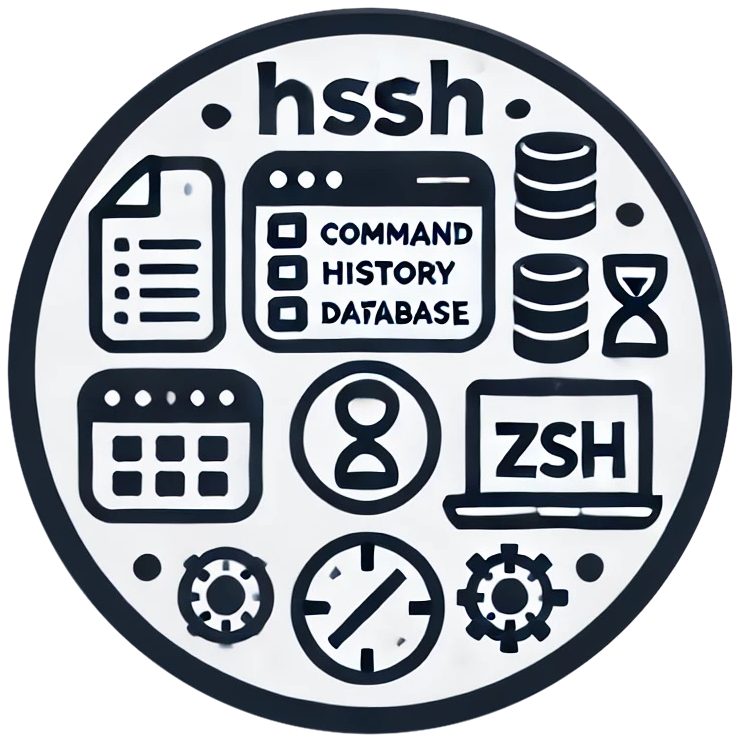A ZSH plugin that captures history in a database
Explore the docs »
Report Bug
·
Request Feature
- Table of Contents
- About The Project
- Getting Started
- Usage
- Roadmap
- Contributing
- License
- Contact
- Acknowledgements
- Docker
- PostgreSQL client (optional, for manual access to the database)
- SQLite (optional, for local file-based logging)
- Python 3.6+
pip(Python package installer)
-
Clone the repo
git clone https://github.com/stiliajohny/historikeeper.git \$ZSH_CUSTOM/plugins/historikeeper -
Deploy PostgreSQL with Docker (optional if using PostgreSQL)
docker pull postgres docker run --name postgres-db -e POSTGRES_USER=postgres -e POSTGRES_PASSWORD=mysecretpassword -e POSTGRES_DB=historykeeper -p 5432:5432 -d postgres
-
Install Python dependencies
pip install -r \$ZSH_CUSTOM/plugins/historikeeper/requirements.txt -
Add the plugin to your .zshrc configuration
plugins=(... historikeeper)
-
Set variables in your .zshrc
HISTORIKEEPER_PRINT_DETAILS=true HISTORIKEEPER_LOG_METHOD="postgres" # Options: "postgres" or "sqlite" # if postgress is used then set the following variables PG_HOST=localhost PG_PORT=5432 PG_USER=postgres PG_DB=historykeeper PG_PASSWORD=mysecretpassword # if sqlite is used then set the following variables SQLITE_DB_PATH=~/.zsh_history.db
-
Source your .zshrc to apply the changes
source ~/.zshrc
- CD in the plugin folder
cd \$ZSH_CUSTOM/plugins/historikeeper/
- Run the import command
python3 ./parse_zsh_history.py -vvvv --input-file ~/.zsh_history --pg-host localhost --pg-port 5432 --pg-user postgres --pg-password mysecretpassword --pg-db historykeeper
The plugin captures each command run in your terminal and logs it to the specified database method (PostgreSQL or SQLite) based on the value of HISTORIKEEPER_LOG_METHOD.
You can view the details of the last command executed directly in your terminal if HISTORIKEEPER_PRINT_DETAILS is set to true.
Example of what is captured:
johnstilia in ~/.config/oh-my-zsh/custom/plugins/historikeeper on master ● ● λ ls
HistoriKeeper.plugin.zsh LICENSE.txt README.md _config.yml
>--------------------------------------------------
Last Command Details:
Epoch Timestamp: 1721927239
Timestamp: 2024-07-25T18:07:19+0100
Command: ls
Command Arguments:
Exit Code: 0
Execution Time (milliseconds): 12
Hostname: Johns-MacBook-Pro.local
Username: johnstilia
Output:
HistoriKeeper.plugin.zsh
LICENSE.txt
README.md
_config.yml
IP Address: Johns-MacBook-Pro.local
PPID: 58531
TTY: /dev/ttys055
Working Directory: /Users/johnstilia/.config/oh-my-zsh/custom/plugins/historikeeper
Shell Type: /bin/zsh
Session Start Time: 2024-07-25T18:07:17+0100
Public IP Address: 152.37.89.249
Public Hostname: 89.37.152.249.bcube.co.uk
>--------------------------------------------------
Toggling Variables:
HISTORIKEEPER_PRINT_DETAILS: true
HISTORIKEEPER_LOG_METHOD: postgres
>--------------------------------------------------See the open issues for a list of proposed features (and known issues).
Contributions are what make the open source community such an amazing place to be learn, inspire, and create. Any contributions you make are greatly appreciated.
- Fork the Project
- Create your Feature Branch (
git checkout -b feature/AmazingFeature) - Commit your Changes (
git commit -m 'Add some AmazingFeature') - Push to the Branch (
git push origin feature/AmazingFeature) - Open a Pull Request
Distributed under the GPLv3 License. See LICENSE for more information.
John Stilia - [email protected]







